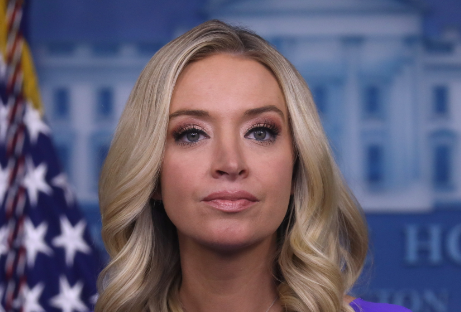Kayleigh McEnany Stops LIVE Show Mid-Air -- Shares Shocking News

Former Trump White House press secretary Kayleigh McEnany criticized Democrats for their attempts to remove former President Donald Trump from the ballot.
McEnany discussed the left’s efforts to challenge the Supreme Court's legitimacy with former Deputy Independent Counsel Sol Wisenberg.
Here's the exchange’s transcript:
WISENBERG: “I think they will take a look at presidential immunity in the context of criminal prosecutions. I think they may take a look at the gag order, and I think it’s very important that they try to decide this with as much unanimity as they can. And I think this will not be a particularly close decision. This section of the 14th Amendment that the Colorado Supreme Court utilized, the majority, is simply not self-executing in my view. That was the position of the then-chief justice of the United States, Salmon Chase, in 1869, less than one year after the 14th Amendment was ratified. I don’t see this as much—so much as an issue of election interference, though it is—as another example of Trump derangement syndrome, this time in the judiciary. And I point out—I say this not as a political supporter of President Trump; I have never politically supported President Trump, but these efforts are very, very disturbing, and they’re very anti-democratic.”
McENANY: “You know, I would love to know your theory on this, but I have heard other legal analysts say, and you know this, you know, I went to law school, textualism, you look at history and precedent, and a lot of folks say there is a reason the president isn’t listed in this section. They list all these other officeholders, but they don’t list the president. You read that with intention. By design, our founders thought about every single word. So do you think this Section 3 of the 14th Amendment even applies to a former president?”
WISENBERG: “You know, that’s very much disputed. I think there are good arguments on both sides. It’s certainly not clear to me that it does apply to the president, and then if it’s not clear, as you know, if the text isn’t clear, you get to go to history and structure and things like that. So some of these questions are close on this issue of what the clause means, but to me, the critical thing, which was discussed in one of the dissents, is that I believe it was Justice Samour who focused on Griffin and the fact that this is not self-executing. What that means is that Congress must put teeth into this section of the 14th Amendment. Congress must say, ‘Here is how we are going to enforce this disqualification clause.’ Now, they did that. They passed a criminal law. It is still on the books, 18 USC 2383. Jack Smith did not indict former President Trump for that. So that’s one critical thing. It’s not a self-executing portion of the 14th Amendment. And two, you have to provide due process. You have to provide due process to somebody you are going to take off the ballot. The process provided here was an absolute joke. President Trump’s people didn’t have the right to subpoena documents; they didn’t have the right to subpoena witnesses. There was not a fair trial in any sense of the word here.”
Earlier this week, on Monday:
As efforts to keep former President Donald Trump off the ballot in numerous states before the 2024 election continue, the U.S. Supreme Court granted success to his campaign on Monday.
“The Court denied a writ of certiorari petition from John Castro, a registered Republican candidate for president in 2024, who sought to have Trump removed from the ballot in Arizona,” Newsweek reported.
“Castro, John A. V. Fontes, AZ Sec. Of State, et al. The petition for a writ of certiorari before judgment is denied,” the high court said in its ruling, which rejected a review of an earlier decision to allow Trump on the ballot in the state.
Due to his claimed involvement in the January 6 riots and attempts to rig the 2020 election, Castro had sued in multiple states to have Trump removed from the ballot.
Castro filed the case with the U.S. Supreme Court after U.S. District Judge Douglas L. Rayes dismissed it in December.
According to NBC News, the court stated in his decision that Castro’s case “lacks standing to bring his claim.” Castro maintained that Trump ought to be barred from the Arizona election for purportedly endorsing “insurrectionists” on January 6, 2021.
His arguments “do not show that Castro is truly competing with Trump,” the judge added.
The Colorado Supreme Court had banned Trump from the state’s ballot in 2024, but the high court overturned that decision in March, providing much-needed relief for Trump.